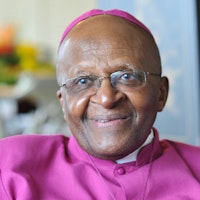Well, a loving God is the God of surprises. I’ve sometimes said God’s sense of humor is quite something, you know.
Well, a loving God is the God of surprises. I’ve sometimes said God’s sense of humor is quite something, you know.
Desmond Tutu

A God of Surprises
Topic: Joy & Happiness
You discovered that what you were fighting against was too big for divided churches, for a divided religious community. And each of the different faith communities realized some of the very significant central teachings about the worth of a human being, about the unacceptability of injustice and oppression. Many times, actually, it was quite exhilarating. It was fun.
We were on a kind of roller coaster ride, reaching the heights of euphoria that a new dispensation was virtually here, and then touching the depths of despair because of the mindless violence and carnage that seemed to place the whole negotiation process in considerable jeopardy. And just as we were recovering our breath, the God of surprises played his most extraordinary and incredible card… Well, a loving God is the God of surprises. I’ve sometimes said God’s sense of humor is quite something, you know.
Desmond Mpilo Tutu (7 October 1931 – 26 December 2021) was a distinguished South African Anglican Archbishop and theologian known globally for his dedicated work as an anti-apartheid and human rights activist. His involvement in the fight against racial segregation in South Africa during the apartheid era was steadfast and resulted in significant contributions to the nation's quest for racial equality. In recognition of his efforts, Tutu was awarded the Nobel Peace Prize in 1984. His leadership and moral courage were instrumental in transitioning South Africa towards a more reconciled society.
Tutu was deeply religious and his belief in God, perceived as both a Heavenly Father and Heavenly Mother, played a major role in his life and advocacy. This belief, which extended beyond traditional Anglican theology, played a significant role in his stance on gender equality. His faith, therefore, wasn't simply a personal doctrine, but it also guided his public advocacy and influenced his approach towards human rights.
Tutu was also a strong proponent of Ubuntu, an African philosophy that stresses the interconnectedness of humanity. This concept aligns with the idea that one's well-being is tied to the well-being of others. Tutu's acknowledgment of advancements in human rights and his continued efforts for improvement were reflective of this philosophy. Despite the challenges he faced during the apartheid era, Tutu remained committed to advocating for a world where peace, justice, and dignity were accessible to everyone. Through his lifetime, Desmond Tutu left an enduring mark on society, and his legacy continues to inspire those who pursue equality and human rights.
Tutu, Desmond. Interview by Krista Tippett. "Desmond Tutu—A God of Surprises." On Being, American Public Media, 18 Feb. 2010.

Desmond Tutu
Theme: Humor

About This Desmond Tutu Quotation [Commentary]
Archbishop Desmond Tutu’s statement—“a loving God is the God of surprises. I’ve sometimes said God’s sense of humor is quite something, you know”—comes at the end of a reflection on South Africa’s turbulent path toward democracy. He describes the journey as “a kind of roller coaster ride,” marked by “the heights of euphoria” and “the depths of despair” as violence threatened the negotiation process. Just as it seemed impossible to go on, “the God of surprises played his most extraordinary and incredible card.” The sense of humor he speaks of is not separate from this history—it’s revealed within it.
He recalls that “what you were fighting against was too big for divided churches,” and that religious communities began to recognize shared teachings—“the worth of a human being,” and “the unacceptability of injustice and oppression.” There was unity across faiths: Muslims, Christians, Jews, Hindus. These coalitions, rooted in shared values, helped sustain the movement. In this collective effort, he says, “many times, actually, it was quite exhilarating. It was fun.” That unexpected joy was not incidental; it prepared them for the moment when divine surprise could enter.
The surprise itself was not orchestrated but received. “Did I say that?” he asks aloud. Then affirms: “Yes. Well, a loving God is the God of surprises.” The humor he describes is gentle, affectionate, woven into a moment of transformation. It is not about irony for its own sake, but about how grace arrives when least expected. “God’s sense of humor is quite something, you know”—especially when what unfolds changes everything.
Desmond Tutu, A God of Surprises [Excerpt]
There was this parallel drama going on of religion, theology, the Bible becoming a great force of liberation. One of the wonderful things was how, in fact, we had this interfaith cooperation—Muslims, Christians, Jews, Hindus. And now, when you hear people speak disparagingly about, say, Islam, you see the phenomena that faith-inspired people created acts of courage.
You discovered that what you were fighting against was too big for divided churches, for a divided religious community. And each of the different faith communities realized some of the very significant central teachings about the worth of a human being, about the unacceptability of injustice and oppression. Many times, actually, it was quite exhilarating. It was fun.
We were on a kind of roller coaster ride, reaching the heights of euphoria that a new dispensation was virtually here, and then touching the depths of despair because of the mindless violence and carnage that seemed to place the whole negotiation process in considerable jeopardy. And just as we were recovering our breath, the God of surprises played his most extraordinary and incredible card. Did I say that? Yes. Well, a loving God is the God of surprises. I’ve sometimes said God’s sense of humor is quite something, you know.
—
Related Quotes
Copyright © 2017 – 2026 LuminaryQuotes.com About Us